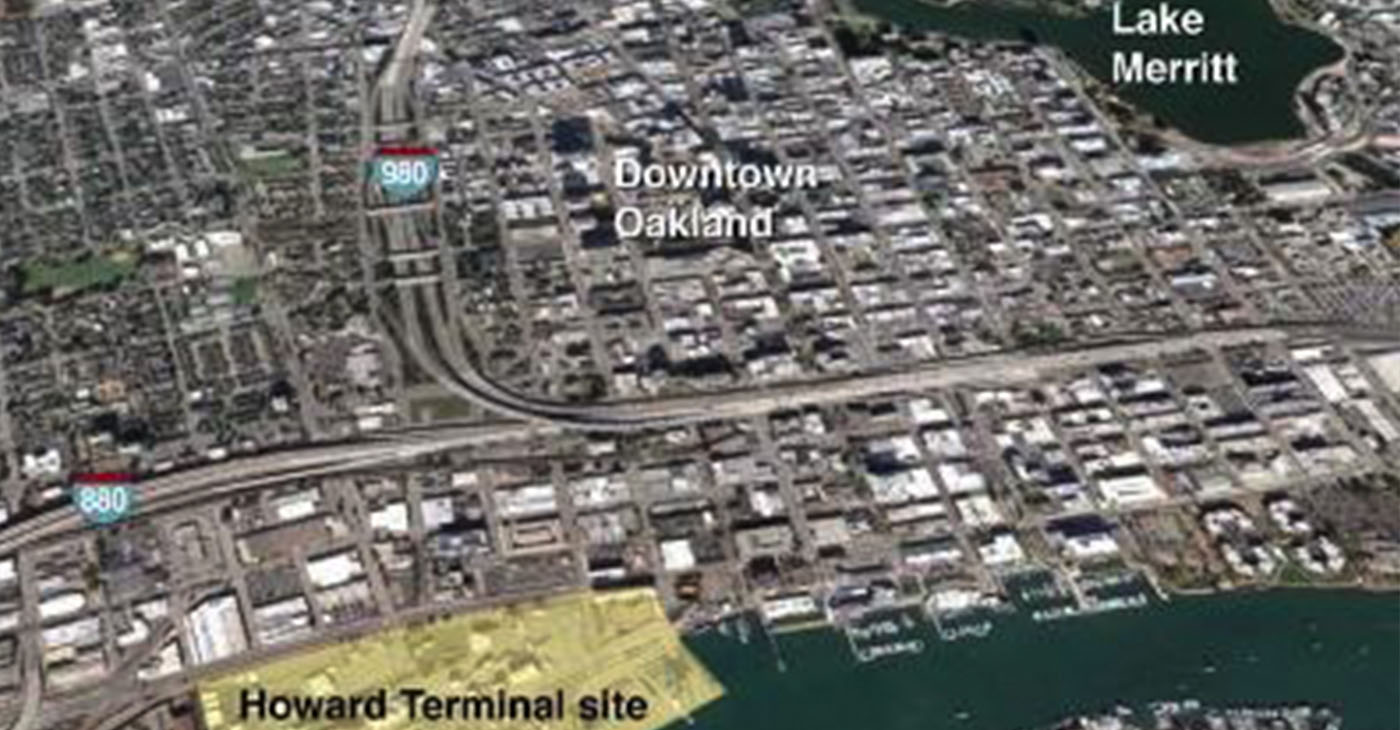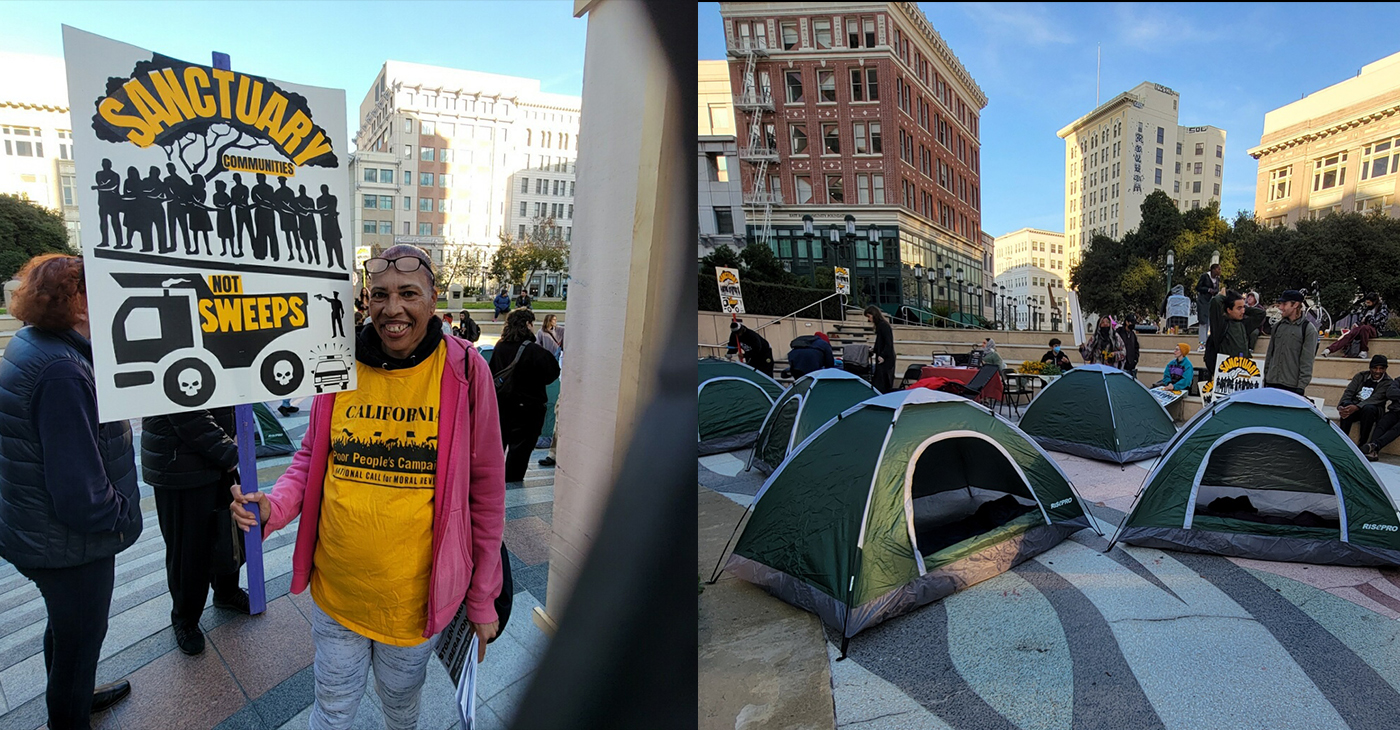Activism
OPINION: Review by Planning Commission on Jan. 19 does not give citizens enough time to review
Oaklanders said they did not want this development to be built at the Port because the Port is Oakland’s biggest economic asset, and Port businesses will be harmed by having luxury residences adjacent to a 24/7 working seaport. The city staff report essentially says this will not be figured out in environmental impact. Both Port businesses and the most affected union workers say they will be harmed. And, while there have been some conversations between Port representatives and Port businesses, the issues raised have not been resolved.

In Pre-Christmas Surprise, Oakland Mayor, City Staff Quietly Release 3,500 Page Report on Port Stadium Project
By Kitty Kelly Epstein
Six days before Christmas, Oakland City staff issued a 3,500-page document on billionaire John Fisher’s luxury housing project at Howard Terminal and scheduled a vote on it by the Planning Commission three weeks after Christmas.
Obviously, few of us can read 3,500 pages in that amount of time. So, the mayor and city staff who work for her have made it pretty clear that they don’t care whether the public has meaningful input.
I’m one of the people who can’t read 3,500 pages in a couple of days. So, in this column I simply point out a very few of the issues raised by 400 Oakland residents who critiqued Fisher’s real estate development on Port land and that are still not solved. Read the report here: www.oaklandca.gov/documents/response-to-comments-final-eir-for-the-oakland-as-waterfront-ballpark-district-project-chapters-and-appendices. Oaklanders said they did not want to have thousands of people running across busy Southern Pacific railroad tracks every time a ball game is played at the proposed stadium, because people already die crossing those tracks, and the numbers would likely increase. There are no realistic new solutions to this problem proposed. One overcrossing is proposed, which is completely insufficient (p. 4-8 and 7-3).
Oaklanders said they did not want this development to be built at the Port because the Port is Oakland’s biggest economic asset, and Port businesses will be harmed by having luxury residences adjacent to a 24/7 working seaport. The city staff report essentially says this will not be figured out in environmental impact. Both Port businesses and the most affected union workers say they will be harmed. And, while there have been some conversations between Port representatives and Port businesses, the issues raised have not been resolved (p. 4-9 and 4-13).
Oaklanders said the project would create massive traffic and parking problems, particularly for the residents of West Oakland. The document essentially agrees that these problems are real but says that the city has fulfilled its responsibility under the law by acknowledging the problems (4-184). And I can find nowhere else in the report that the tiny number of parking spaces provided by the project has in any way been realistically mitigated in its effect on West Oakland parking and traffic given the thousands of new residents, workers, and game attendees involved.
Most important of all, perhaps, is the fact that Oaklanders do not want to pay for the project with public funds. The city says it is paying $350 million of infrastructure with state, federal, and regional transportation dollars.
Those are tax dollars, and nobody in Oakland decided that’s how we would want $350 million in transportation funds to be spent. Most of our residents (and the planet) need for us to have expanded, excellent, cheap, fast public transportation more than we need to help a billionaire with infrastructure funding for his private project.
There is an additional proposed financing plan for this project that also involves public funding. While not addressed in the Environmental Impact Report (EIR), it certainly has an ‘environmental’ impact on those of us who are not rich and whose quality of life is impacted by the ways that our public property and funding is used.
And there is a lot of research on the impact of stadiums on the local economy. One, by Stanford economist Roger Null, for example, says that “sports stadiums do not generate significant economic growth” (https://news.stanford.edu/2015/07/30/stadium-economics-noll-073015/). And he isn’t even discussing a project like Oakland’s which will actually harm the local economy by hurting Port business.
So why is this project still being discussed at all? It will harm current residents in a dozen different ways. Essentially, this deal creates an exclusive enclave, a new Piedmont, in the center of Oakland on our publicly owned Port property that we will pay for decades. Although no one has asked Oakland residents directly what we think, my impression is that a majority of residents would not support it, given the public costs, the damage to the Port, and the displacement caused to current residents.
Activism
Oakland Post: Week of December 25 – 31, 2024
The printed Weekly Edition of the Oakland Post: Week of December 25 – 31, 2024

To enlarge your view of this issue, use the slider, magnifying glass icon or full page icon in the lower right corner of the browser window. ![]()
Activism
Living His Legacy: The Late Oscar Wright’s “Village” Vows to Inherit Activist’s Commitment to Education
Kingmakers of Oakland (KOO), a nonprofit organization that works to improve educational and life outcomes for Black boys and men, stated that “Oscar Wright is one of the most prolific, consistent, and committed advocates of equity for Black students and Black Families here in Oakland for the past six decades.”

By Antonio Ray Harvey, California Black Media
Activists mourning Oscar Carl Wright’s death, have pledged to continue his lifelong mission of advocating for Black students and families in Northern California.
Wright, 101, who passed away on Nov. 18, was involved in Oakland’s educational affairs until his death.
Now, friends and admirers acknowledge that carrying on his legacy means doubling down on the unfinished work that Wright dedicated his life, time, and resources to, according to Y’Anad Burrell, a family friend and founder of San Francisco-based Glass House Communications (GHC).
“Mr. Wright did a lot of work around equity, specifically, for Black students based on their needs — whether it was tutoring, passing classes, or graduating,” Burrell said.
Wright became a champion for his children’s education, recognizing the disparities between their school experiences and his own upbringing in the Mississippi Delta.
Burrell told California Black Media (CBM) that the crisis of unequal access to resources and a quality education continues to affect the Oakland Unified School District (OUSD).
According to Oakland Reach, in the city of Oakland, only 3 in 10 Black and Brown students are reading at or above grade level. In addition, only 1 in 10 are doing math at or above grade level.
Oakland REACH is a parent-run, parent-led organization. It aims to empowers families from the most underserved communities to demand high-quality schools for their children.
Wright’s work as an activist had impact across the state but he was primarily known in the Bay Area. Alongside the Black United Front for Educational Reform (BUFER), he filed a complaint against OUSD for violating the Civil Rights Act of 1964.
In 2000, the OUSD school board proposed an action plan to address educational inequity, but it was never implemented.
Wright later founded the African American Honor Roll Celebration at Acts Full Gospel Church, an award that recognizes Black students with a grade point average of 3.0 or better. Each year, more than 1,000 students are honored at this ceremony.
Kingmakers of Oakland (KOO), a nonprofit organization that works to improve educational and life outcomes for Black boys and men, stated that “Oscar Wright is one of the most prolific, consistent, and committed advocates of equity for Black students and Black Families here in Oakland for the past six decades.”
Burrell said that one of the main reasons Wright’s work was so essential for families and children in Oakland that is the direct relationship between acquiring a quality education and affording quality housing, maintaining food security, achieving mental wellness, and securing stable employment.
Wright was the child of sharecroppers from Coahoma County, Mississippi. He attended Alcorn State University, a Historically Black College and University (HBCU).
In the late 1950s, Wright and his family relocated to the Bay Area where he worked as a contractor and civil engineer. He later became an active member of the National Association for the Advancement of Colored People (NAACP).
Burrell said the people who will carry on Wright’s work are part of a “village” that includes KOO’s CEO Chris Chatmon. Wright was a mentor to Chatmon.
“It will not be one entity, one person, or one organization that picks up the baton because it was a village effort that worked alongside Mr. Wright for all these years,” Burrell said.
Burell says that legacy will live on.
Activism
Protesters Gather in Oakland, Other City Halls, to Halt Encampment Sweeps
The coordinated protests on Tuesday in San Francisco, Oakland, Vallejo, Fresno, Los Angeles and Seattle, were hosted by Poor Magazine and Wood Street Commons, calling on cities to halt the sweeps and focus instead on building more housing.

By Post Staff
Houseless rights advocates gathered in Oakland, San Francisco, Los Angeles, and other city halls across California and Washington state this week protesting increased sweeps that followed a U.S. Supreme Court decision over the summer.
The coordinated protests on Tuesday in San Francisco, Oakland, Vallejo, Fresno, Los Angeles and Seattle, were hosted by Poor Magazine and Wood Street Commons, calling on cities to halt the sweeps and focus instead on building more housing.
“What we’re dealing with right now is a way to criminalize people who are dealing with poverty, who are not able to afford rent,” said rights advocate Junebug Kealoh, outside San Francisco City Hall.
“When someone is constantly swept, they are just shuffled and things get taken — it’s hard to stay on top of anything,” said Kealoh.
Local houseless advocates include Victoria King, who is a member of the coordinating committee of the California Poor People’s Campaign. She and Dr. Monica Cross co-chair the Laney Poor People’s Campaign.
The demonstrations came after a June Supreme Court ruling expanded local governments’ authority to fine and jail people for sleeping outside, even if no shelter is available. Gov. Gavin Newsom in California followed up with an order directing state agencies to crack down on encampments and urging local governments to do the same.
Fresno, Berkeley and a host of other cities implemented new rules, making it easier for local governments to clear sidewalk camps. In other cities, such as San Francisco, officials more aggressively enforced anti-camping laws already on the books.
-

 Activism4 weeks ago
Activism4 weeks agoOakland Post: Week of November 27 – December 3, 2024
-

 Activism2 weeks ago
Activism2 weeks agoButler, Lee Celebrate Passage of Bill to Honor Congresswoman Shirley Chisholm with Congressional Gold Medal
-

 Activism2 weeks ago
Activism2 weeks agoPost News Group to Host Second Town Hall on Racism, Hate Crimes
-

 Activism2 weeks ago
Activism2 weeks agoDelta Sigma Theta Alumnae Chapters Host World AIDS Day Event
-

 Business2 weeks ago
Business2 weeks agoLandlords Are Using AI to Raise Rents — And California Cities Are Leading the Pushback
-

 Activism3 weeks ago
Activism3 weeks agoOakland Post: Week of December 4 – 10, 2024
-

 #NNPA BlackPress4 weeks ago
#NNPA BlackPress4 weeks agoNational Action Network Announces 2025 Inauguration Day Rally
-

 Arts and Culture1 week ago
Arts and Culture1 week agoPromise Marks Performs Songs of Etta James in One-Woman Show, “A Sunday Kind of Love” at the Black Repertory Theater in Berkeley



























































